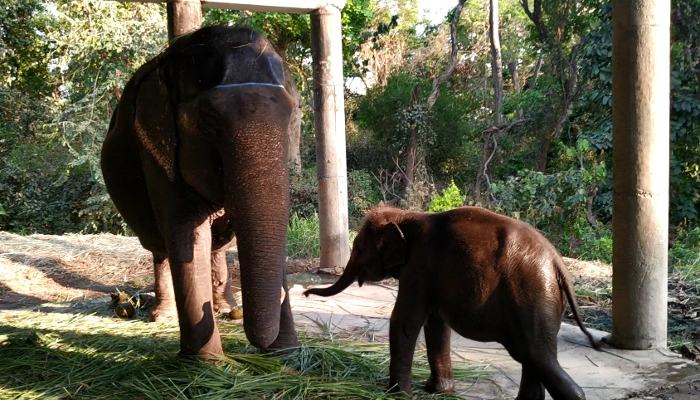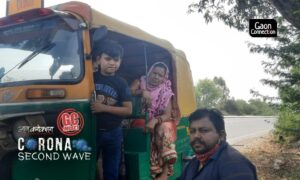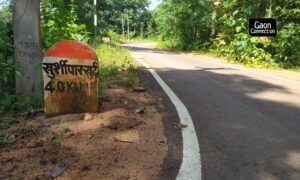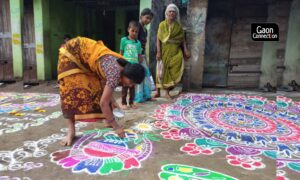Daya Sagar & Arvind Shukla
She loves to take selfies with visiting tourists and play football with her friend Vinayak. She is mischievous, a complete brat, but so lovable that you instantly want to hug her.
She is given special food every day. Her diet includes eight kilo chapattis, half kilo jaggery, half kilo black gram, 250-gram desi ghee, one kilo rice, porridge, grass, half kilo arhar daal (pulses), half-liter milk, 25-gram black pepper, apples, pomegranates, oranges, grapes, and bananas. Overall, around one-and-half-year old Durga is a content baby elephant. It, however, is a miracle that she is alive. She nearly died when she was a baby.
It was in October last year when Durga – who was three-month-old then — lost her way after the herd she was moving with was attacked by honey bees. She was badly injured and for days after the near-fatal bee attack, she roamed around, in pain, looking for her family. The incident happened in the forests of Bijnaur, nearly 450 kms from Uttar Pradesh’s capital Lucknow.
Luckily, she was spotted by some forest officials, who rescued her and brought her from Bijnaor to Dudhwa National park, situated in Lakhimpur district, around 200 kms from Lucknow. Initially, doctors and specialists treated her as she was badly injured. Then the mahauts at Dudhwa National Park took over and have been looking after Durga since then.
“I love Durga the way I would love my daughter. I named her,” said Irshad Mahaut, a caretaker of elephants at Dudhwa National Park. He added: “By the time she was bought here she was near-dead. There were bee stings all over her body. The doctors had to work hard and had to give her glucose for many days. She is still on medication,” said Irshad.
A slow, but steady recovery
“After she came here, she was provided medical assistance by the doctors. Our doctors and caretakers helped her in every possible way. She is fine now,” says Mahaveer Koujalgi, deputy director, Dudhwa National Park. “There were bee stings all over her body. We had to remove those. She was given glucose and baby milk powder for many days. It was challenging for us to restore her health,” said Irshad while pampering Durga.
“I don’t even take holidays now because her health is my primary concern. Now she has started moving around and mingling with other elephants. She is quite mischievous and plays with tourists who come to see her,” said Irshad.
A centre of attention
Initially, Durga was kept in complete isolation as she was in serious condition. In February this year, she was brought in contact with other elephants. She instantly bonded with them. She started eating fodder on her own and learned how to roll on the ground. The other elephants played a key role in making the lost baby feel at home.
“Durga has found a family here now. Rupkali, an elderly female elephant, is very fond of Durga. She is like her mother. She loves to play football with Vidyut, an elephant who is her age. Durga is the most mischievous baby around,” said Ram Pyaare, the forest officer at Dudhwa National park.
Durga on a special diet
Although Durga’s health has improved, complete recovery will take around five years, say caretakes. They are very particular about what they feed her. Her meals are special compared to other elephants as she is given an additional diet of milk, fruits, gram, oatmeal.
“We give her a nutritious meal. We give her eight kgs chapattis, half kg jaggery, half kg grams, 250 grams of pure ghee, one kg rice, half kg pulses, 500 ml milk, 25 grams of black pepper and electrogene powder. We also give her fruits like apples, pomegranates, oranges, grapes, and bananas,” says Ram Khilavan, caretaker of Durga.
Durga is the centre of attention at Dudhwa. “She is very friendly. She grunts loudly when she is happy. She runs around. She loves to play with visiting tourists. She lets them click her pictures and poses for selfies along with them. She even bids them good-bye in her own way with her trunk,” said Irshad.



















